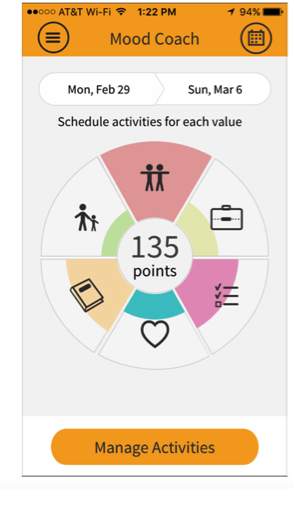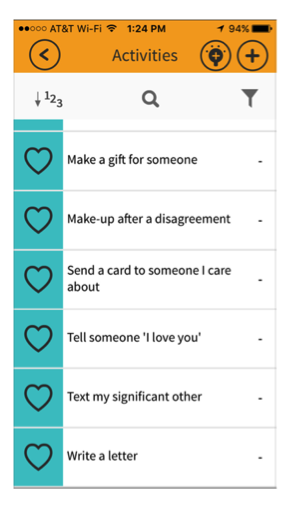Staff Perspective: Behavioral Activation - There’s an App for That!
I recently learned about the Mood Coach app from a participant at one of my recent trainings on CBT for Depression (CBT-D). We’ve tried to include information about pertinent apps in our workshops, as we know that many of the Service members we treat find this type of technology appealing (oftentimes more so than using traditional pencil-and-paper worksheets).
Mood Coach was developed by the VA’s National Center for PTSD, and the current version was released in March of 2016. (Currently, Mood Coach is available as a free download on the iOS platform only). As noted in the official description, Mood Coach is intended to provide a way for Service members and Veterans to “learn and practice Behavioral Activation”.
Before sharing the specifics components of the app, I want to take a moment to briefly define Behavioral Activation. Behavioral Activation is a type of behavioral therapy that emphasizes decreasing avoidance and isolation, which can serve to maintain or worsen symptoms of depression. Instead, it focuses on the importance of gradually increasing engagement in activities on recovery from depression. Behavioral Activation has been widely researched, and it is one of six first-line therapies recommended for treatment of mild to moderate depression in the VA/DoD Clinical Practice Guideline for Management of Major Depressive Disorder (MDD). Behavioral Activation seeks to:
- Help patients understand environmental sources of their depression,
- Target behaviors that might maintain and/or worsen their depression (e.g., avoidance/escape behaviors), and
- Increase rewarding activities in patients’ lives, thereby increasing activation and engagement with the world.
 Mood Coach was designed to help patients enhance their mood through participation in positive activities. When you go through the app’s tutorial, you’re initially prompted to choose a date when you want to put the plan you’re about to develop into action (plans are one week long). You’re then guided through how to develop your individualized plan, beginning with selecting six value areas you’d like to work on (e.g., relationships, health, employment, leisure) and then selecting an activity level for each (beginner, intermediate, or advanced) based on how many activities you’d like to do. The app then walks you through scheduling activities for each chosen value. Slider bars are provided for each activity allowing you to rate how fun, difficult, and important each activity is to you.
Mood Coach was designed to help patients enhance their mood through participation in positive activities. When you go through the app’s tutorial, you’re initially prompted to choose a date when you want to put the plan you’re about to develop into action (plans are one week long). You’re then guided through how to develop your individualized plan, beginning with selecting six value areas you’d like to work on (e.g., relationships, health, employment, leisure) and then selecting an activity level for each (beginner, intermediate, or advanced) based on how many activities you’d like to do. The app then walks you through scheduling activities for each chosen value. Slider bars are provided for each activity allowing you to rate how fun, difficult, and important each activity is to you.
The app includes the following features:
- Activity Scheduling (“My Plan”): This section includes scheduling positive activities based on specified values. Users are asked to choose six of the following ten
 values: family relationships, friendships, intimate relationships, mental & physical health, career/employment, education/training, daily responsibilities, leisure/recreation, spirituality, community/citizenship. They are then asked to add activities for each value.
values: family relationships, friendships, intimate relationships, mental & physical health, career/employment, education/training, daily responsibilities, leisure/recreation, spirituality, community/citizenship. They are then asked to add activities for each value.
- Activity Log (“My Plan History”): This section allows users to track their activities and watch their progress over time.
- Daily Mood Ratings: This section provides users with a daily mood-rating tool on a 0-10 scale. It also allows users to track their mood rating history over time.
- Psychoeducation (“Learn”): This section provides education about depression, depression and PTSD, Behavioral Activation, goal-based action, values, and working through barriers.

- Assessment (“Assess my Symptoms”): This section allows users the ability to take the Patient Health Questionnaire (PHQ-9), a self-report scale used to monitor symptoms of depression. It also allows users to track their scores over time.
- Get Support Now: This section provides users with information on how to access support through various means, including crisis resource information, individualized support networks, and professional care contact information.
Disclaimer: While the Mood Coach can be a helpful tool to augment psychotherapy or to engage in mood tracking, it is not intended to replace psychotherapy for those who need it.
For more information about useful apps, please visit the Apps section of our website.
Marjorie Weinstock, Ph.D. is the Lead, Military Families & CBT for Depression at the Center for Deployment Psychology (CDP) at the Uniformed Services University of the Health Sciences in Bethesda, Maryland.
Reference:
Department of Veterans Affairs & Department of Defense. (2016). VA/DoD Clinical Practice Guideline for Management of Major Depressive Disorder (MDD). Retrieved from http://www.healthquality.va.gov/guidelines/MH/mdd/VADoDMDDCPGFINAL41816.pdf
I recently learned about the Mood Coach app from a participant at one of my recent trainings on CBT for Depression (CBT-D). We’ve tried to include information about pertinent apps in our workshops, as we know that many of the Service members we treat find this type of technology appealing (oftentimes more so than using traditional pencil-and-paper worksheets).
Mood Coach was developed by the VA’s National Center for PTSD, and the current version was released in March of 2016. (Currently, Mood Coach is available as a free download on the iOS platform only). As noted in the official description, Mood Coach is intended to provide a way for Service members and Veterans to “learn and practice Behavioral Activation”.
Before sharing the specifics components of the app, I want to take a moment to briefly define Behavioral Activation. Behavioral Activation is a type of behavioral therapy that emphasizes decreasing avoidance and isolation, which can serve to maintain or worsen symptoms of depression. Instead, it focuses on the importance of gradually increasing engagement in activities on recovery from depression. Behavioral Activation has been widely researched, and it is one of six first-line therapies recommended for treatment of mild to moderate depression in the VA/DoD Clinical Practice Guideline for Management of Major Depressive Disorder (MDD). Behavioral Activation seeks to:
- Help patients understand environmental sources of their depression,
- Target behaviors that might maintain and/or worsen their depression (e.g., avoidance/escape behaviors), and
- Increase rewarding activities in patients’ lives, thereby increasing activation and engagement with the world.
 Mood Coach was designed to help patients enhance their mood through participation in positive activities. When you go through the app’s tutorial, you’re initially prompted to choose a date when you want to put the plan you’re about to develop into action (plans are one week long). You’re then guided through how to develop your individualized plan, beginning with selecting six value areas you’d like to work on (e.g., relationships, health, employment, leisure) and then selecting an activity level for each (beginner, intermediate, or advanced) based on how many activities you’d like to do. The app then walks you through scheduling activities for each chosen value. Slider bars are provided for each activity allowing you to rate how fun, difficult, and important each activity is to you.
Mood Coach was designed to help patients enhance their mood through participation in positive activities. When you go through the app’s tutorial, you’re initially prompted to choose a date when you want to put the plan you’re about to develop into action (plans are one week long). You’re then guided through how to develop your individualized plan, beginning with selecting six value areas you’d like to work on (e.g., relationships, health, employment, leisure) and then selecting an activity level for each (beginner, intermediate, or advanced) based on how many activities you’d like to do. The app then walks you through scheduling activities for each chosen value. Slider bars are provided for each activity allowing you to rate how fun, difficult, and important each activity is to you.
The app includes the following features:
- Activity Scheduling (“My Plan”): This section includes scheduling positive activities based on specified values. Users are asked to choose six of the following ten
 values: family relationships, friendships, intimate relationships, mental & physical health, career/employment, education/training, daily responsibilities, leisure/recreation, spirituality, community/citizenship. They are then asked to add activities for each value.
values: family relationships, friendships, intimate relationships, mental & physical health, career/employment, education/training, daily responsibilities, leisure/recreation, spirituality, community/citizenship. They are then asked to add activities for each value. - Activity Log (“My Plan History”): This section allows users to track their activities and watch their progress over time.
- Daily Mood Ratings: This section provides users with a daily mood-rating tool on a 0-10 scale. It also allows users to track their mood rating history over time.
- Psychoeducation (“Learn”): This section provides education about depression, depression and PTSD, Behavioral Activation, goal-based action, values, and working through barriers.

- Assessment (“Assess my Symptoms”): This section allows users the ability to take the Patient Health Questionnaire (PHQ-9), a self-report scale used to monitor symptoms of depression. It also allows users to track their scores over time.
- Get Support Now: This section provides users with information on how to access support through various means, including crisis resource information, individualized support networks, and professional care contact information.
Disclaimer: While the Mood Coach can be a helpful tool to augment psychotherapy or to engage in mood tracking, it is not intended to replace psychotherapy for those who need it.
For more information about useful apps, please visit the Apps section of our website.
Marjorie Weinstock, Ph.D. is the Lead, Military Families & CBT for Depression at the Center for Deployment Psychology (CDP) at the Uniformed Services University of the Health Sciences in Bethesda, Maryland.
Reference:
Department of Veterans Affairs & Department of Defense. (2016). VA/DoD Clinical Practice Guideline for Management of Major Depressive Disorder (MDD). Retrieved from http://www.healthquality.va.gov/guidelines/MH/mdd/VADoDMDDCPGFINAL41816.pdf

